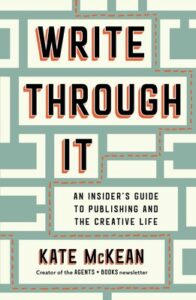This first appeared in Lit Hub’s Craft of Writing newsletter—sign up here.
A query letter is a cover letter. That’s it. I know it’s not that simple, but I really want to take away some of its power. Yes, sometimes that’s all an agent will see of your work. Yes, that means it has to do a lot in a little space. But trust that agents recognize how hard this part is, and we know how to spot something interesting through all your nervousness and posturing and meaningless typos.
I like to break down queries into several smaller parts so you can tackle them one by one, and then make it your own.
Salutation
First, we start with a salutation. This is a letter, after all. You should address it to someone. Dear Kate is an acceptable salutation. Yes! Even my first name! I don’t care.
If you are not comfortable with that, you can write Dear Ms. McKean. If you are not sure of an agent’s gender, honorific, or marital status, you can write Dear Kate McKean. All fine options! Just avoid assuming a gender binary or anyone’s marital status. Please do not write To Whom It May Concern or Dear Agent. That just makes me feel like another number on your list. If you spell an agent’s name wrong or use the wrong honorific, just take a deep breath. It’s OK! Typos happen! Lots of people think my name is Kate McLean for some reason. We understand. Do not fall on your sword in follow-up emails. You may send an apology email if you must, but queries are hard and we are all human. Try better next time.
Body Paragraphs
I think it is helpful to put the most salient info about your book right up front: title, genre, word count. Your first sentence of your query might read something like I’m thrilled to send you my historical novel called Mrs. Vanderbilt Goes to the Market, complete at 80,000 words. Look at that! Title! Genre! Word count! All there up front. Right away I can tell if this is a genre I represent or am hot for, and if the word count is in a reasonable range for the genre. Sometimes a title can draw an agent in, but at the very least, it gives us a little flavor of a book. If you are writing nonfiction, tell me your estimated word count. That’s fine. I just need to know that you have thought about how long the book will be. If you’re wrong and I still like that idea, we’ll talk about it!
Are you required to start a query this way, whether it’s for me or another agent? No! But I do think it gets very important info out there neatly and right away, and I think many agents will appreciate that. And no, it won’t make your query sound generic and like everyone else’s. Informative is good! Being different or unique for the sake of attention getting is tiresome when an agent is reading dozens of queries at a time.
The next part is where you tell me about your book. This can be in one or several paragraphs, depending on your book and your style. There is no correct number of paragraphs or word count here. You just want me to be able to answer a few questions about your book by the end of it.
Those questions include but are not limited to: What’s your book about? Who are the main characters and what do they most want? What is at stake in your book? In nonfiction, what is the promise of your book and how do you fulfill it? What happens in the end?
YES, YOU CAN TELL AGENTS WHAT HAPPENS AT THE END OF YOUR BOOK! Cliffhangers in queries do not entice the agent to read the whole book to find out what happened. Frankly, by the time we’ve read your whole manuscript, most agents have forgotten what your query said anyway. And by that point, whatever you did worked.
There’s going to be so much you do not put in these summary paragraphs in your query. Whole plot lines. Most origin stories. Every character’s middle name. Many of the steps that advance your argument in nonfiction. It is impossible to put everything in your query, because then it would just be your whole book. Focus on the high points and the stakes, or the book’s promise to the reader. You can format this like you would the back cover copy (i.e., the summary on the back of a book) if that helps you get started. It’s much easier to write long and cut back. Back cover (or flap) copy for a book is about 350 words. That’s a good ballpark to aim for, but it’s not a hard-and-fast rule. If you’re tripling or quadrupling that number, it’s a sign to cut back.
If you’re really stuck, take this advice from Julia Cameron’s Write for Life. What would you say if you could say anything at all? How would you describe your book to a friend? Or if you knew for a fact that any agent you contacted would request the full manuscript? This might take the pressure off enough to cure any fear paralysis. Run with that and see what you have! You might be able to use a lot of it for your final query letter.
Next, you’ll include your author bio. This is a much more critical element for nonfiction than fiction, so I’ll cover fiction first.
Author Biography: Fiction
A completely acceptable bio for a debut novel or other fiction project is “This is my first novel. By day I am an accountant for a software firm.” Period, end of bio. Seriously that is OK! I promise you will not be automatically rejected if you do not have an MFA or previous publication credits or any other supposed pedigree in your fiction author bio. If you do have other relevant credentials, include them. Those could be other publication credits (usually related broadly to the genre of your book, but it’s OK to put professional/other credits in there; please don’t include your high school newspaper, etc.), relevant education, awards/contests won, previous book publications (including self-published works). The point of this paragraph is to give us a sense of who you are outside of this book, not to judge whether you are qualified or whatever to be a writer. You already are. You wrote the book; therefore, you are qualified to do it.
Author Biography: Nonfiction
Now here is where it gets tricky. Agents and editors pay much closer attention to an author’s bio and platform when it comes to nonfiction. Why? Not because you have to prove you know what you’re doing, not because you have to earn the privilege to write a book, but because the reader cares about your authority.
Think about how you choose a nonfiction book to read yourself. Maybe you’re choosing a cookbook. Who’s the author? Do they have a restaurant? TV show? A well-known Instagram or YouTube channel? Yeah, they probably do, and that means something to you. When you see an author with one million followers on TikTok, those numbers carry the weight of a personal recommendation. You might think If a million other people like this, it must be good.
On the other hand, you might be looking for a cookbook about a specific cuisine or technique. You’ll see where that author studied or worked or where they’re from and make your judgment from there. Would you spend upwards of forty dollars of your hard-earned money on a book that was just by some home cook who said Trust me, I promise these are good? Probably not. You may not have actually heard of the author when you choose to buy a book, but there’s something about their bio that says You can trust me, I know what I’m talking about. What is relevant about your bio that would make a reader think this? That’s what you put in your query letter.
Your bio dovetails with the concept of a platform, and sometimes it’s hard to differentiate between them.
As I’ve said before, the book you’re querying cannot build your platform. It has to be there already. I’ve seen many queries that say book comes out, I’m happy to do whatever it takes to build my platform. That is true but not helpful. If you don’t have a platform yet, focus on that instead of querying for the moment.
What About Author Bios for Memoirs?
Memoir is in a tricky space between fiction and nonfiction. Sometimes that is literal, as in the dialog in a memoir is almost never a verbatim transcript of actual conversations. In terms of how writers present their books to agents and editors as well as how readers buy those books, it’s all about the story of how real events happened. At the same time, memoirs are judged along the same lines as nonfiction when it comes to author platform. Readers ask: Who is this person and why should I care about their story? Have I heard of them before? Is their perspective one I trust?
A memoir query has elements of both fiction and nonfiction queries. It likely tells the story of the memoir—what happens, what changes—like a novel but presents an author bio like a nonfiction book.
Sometimes it’s enough for a memoir author bio to be I’m qualified to write about this because it happened to me. Of course that’s true. But it might not be enough to sway readers to trust and buy the book. Go look at the bios of other (non-celebrity) memoirs that you’ve liked. Did you notice their bio when you picked it up, or did you already know about them, and from where? If you hadn’t heard of them before, what drew you in? The title? The cover? The subject matter? When you decided to buy or borrow it, what made you trust their voice and story? Can you think of memoirs where you didn’t trust the voice or story? What made you think that way? How can you apply this to positioning your own bio?
Closing
A query is a letter, so you need a closing too. And you can use any standard closing remark you want. Thank you for your time. I look forward to hearing from you. Sincerely, [Author]. I don’t care about this part at all, but I’ve found it necessary to mention it when I talk about query letters because it’s another part of the process that authors worry about. There was a time when it was customary to include in that closing that you were sending your query widely, that it is a “simultaneous submission.” People still do that and it’s fine, but I assume I am not the only agent getting your query. Don’t overthink the closing. Whatever you put that isn’t rude or there for shock value or attention getting is fine.
______________________________________________

